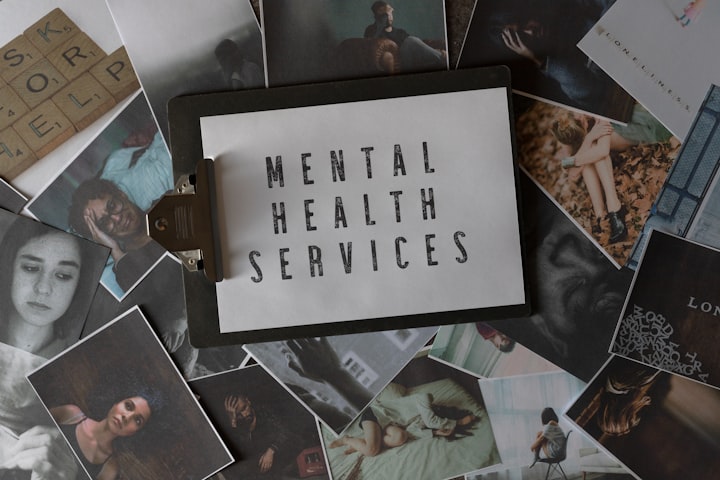Mental Health Services: A Disillusionment
A UK-Based Analysis of the Mental Healthcare System

Mental health has been at the forefront of media in the UK for a long while now with thousands of charities offering mental health help. Personally, in my time, I have spent the last fourteen years accessing various mental health services on and off, I have been put on various medications and I have been taken off others. Without saying too much about my own mental health issues, there is one thing that I noticed above anything else. The thing I noticed was that if you go to access your local mental health services in the UK, you will be met with leaflets and the ‘don’t be sad’ or ‘don’t worry’ speeches. These not only don’t help, but with some it can turn them off even contacting mental health services since it seems like reductive practice that is mainly meant to get you, the patient, to go away. The people within these jobs do not understand mental health problems and how each differs from the other, they do not understand the depth of feeling and the various symptoms both physical and mental that come along with it. They are simply there, on the phone or face-to-face, to tell you that there is a leaflet you should read. It is a reductive and damaging approach which makes me really question what the true outcome of this is. Do they actually want to make us feel better, or do they want to keep people in jobs and therefore, keep you coming back to the service over and over again, dissatisfied?

It is not only cookie-cutter textbook responses that do not help anyone which begin the long strife of someone becoming dissatisfied and disillusioned with their local mental health services, but it is also the patronising way in which we are spoken to. I have noticed especially over the course of the last decade or so that mental health workers tend to talk to you as if you are stupid and do not take your true intentions into account. Personally, when I seek mental health help, I go with a plan of what I want to explain. These include: physical and mental symptoms, things I cannot fathom that are happening to me such as sleeplessness and finally, what I have been doing to try and deal with these and whether they have gained a negative or positive insight into the symptoms themselves. If I were to go to my local mental health services, this explanation would be fobbed off, not listened to thoroughly or taken with a ‘huh’ and then the worker would say whatever they were going to say in the first place, send me a leaflet to my house and tell me to contact them if anything else arose. This is unacceptable. If a person was truly suicidal and was treated this way, this could be the straw that broke the metaphorical camel’s back - someone acting as if they do not care or that you are wasting their time. So now, as we conclude, this mental health service has had the exact opposite effect that it was supposed to and has actually caused more damage than repair. Apart from this though, there are long ‘waiting lists’ to simply talk to someone who will provide very little help and act as if the patient is a burden instead of being willing to help them. With certain charities this is more of the case than others, but the massive endorsement of said organisation as a mental health service that is there to help 24/7 seems wrong when the organisation themselves have declined to help people, or have impacted the mental health of others negatively.

The result of this becomes something far more strange than the outset. It is not just the person goes away dissatisfied and disillusioned with their local mental health services, but it is also that now the person is biased towards not accepting mental health help because of their bad experiences with a service that was there to apparently help them. This makes it far more difficult to accept help int the future where it may be even more necessary than before. For the average person it makes them dip into their already empty pockets to pay for professional help and for the average person who cannot afford, it makes them ‘deal with it’ being the way things are going to be from now on. This can be especially damaging and can lead to worse health and even death. So why are free mental health services basically failing their patients. One only has to have a look at the reviews of these services to find out what has happened, but why is it happening? The dissatisfaction may lead some to come back, it may also lead some to quit getting help altogether. But, in a more sinister aspect of our government controlled systems, the mental health services may not actually want to help you at all. Instead, they want to keep their waiting lists looking long and their appointments looking full so that they can be seen as more exclusive. Constant cuts to the services though means that the workers providing the help are far less than adequate to do so. The spiral of negative experience could actually end up killing someone.

When it comes to paying for mental health help, this is obviously a luxury only afforded by those who can pay for it and many cannot. Proper mental health help is a luxury across the world with the USA only providing paid services and the UK providing free services that may as well not exist and thus the paid services are the only way to go for someone with real mental health issues. When it comes to the stigma surrounding mental health help, this can seriously harm the meaning attached to it. Free mental health services in the UK obviously keep people as anonymous figures, but on an application that is paid for, you are automatically an account and a person and thus, the more ‘people’ paying for this help can make mental health seem like a middle class problem. For those who do not have mental health issues and do not understand the way in which they work, they could assume that the person in trouble simply ‘is not working hard enough…’ or that it is a ‘first world problem…’ when in fact, mental health problems have constantly been linked to the middle class world and are therefore more like to impact people with more connections to other people by which to compare. If you have no access to other people then it is difficult to compare lifestyles as opposed to if you are connected to everyone all the time. However, this also does not mean that nobody else suffers with these issues. Adults who are facing financial issues are far more likely to feel the physical symptoms of extreme depression than teenagers on social media since food and water are still requiring to be paid for. But for these people who experience very realistic issues that cannot be solved by the reductive free services in this country, they must turn to the paid services which they already cannot afford. Real mental health help has been gentrified by the middle class to be a service that only they should be able to afford through the argument that ‘social media causes depression’. The people who have issues in the real world that cannot be solved by signing out of an application therefore get left in the dirt.

One way I have seen people trying to solve this problem is that on social media, those who are getting paid mental health help by professional therapists begin a ‘post’ and everyone leaves advice they got on their mental health in the comments section to help others who are struggling. In theory this is a good idea, but this should not have to exist. The government should focus on hiring more qualified people for the job. Not just any random person who has a diploma in social studies.

In conclusion, between the free mental health services not actually wanting to provide any real help and because of budget cuts, hiring people who clearly are not qualified to provide help to people suffering with mental health issues, the gentrification of real mental health help and the fact that local services have disillusioned the people really in need - it is no surprise as to why mental health issues are on the rise amongst almost everyone. A reform to this system is needed and quickly before the suicide rates go up again.
About the Creator
Annie Kapur
195K+ Reads on Vocal.
English Lecturer
🎓Literature & Writing (B.A)
🎓Film & Writing (M.A)
🎓Secondary English Education (PgDipEd) (QTS)
📍Birmingham, UK






Comments
There are no comments for this story
Be the first to respond and start the conversation.